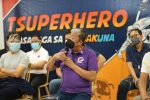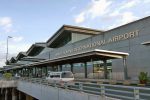‘Unahin ang mga mahihirap’ — Bong Go urges gov’t

Senator Christopher “Bong” Go has called upon the government to bolster its efforts to provide livelihood interventions for those in need, considering data indicating a sharp increase in the number of Filipinos rating themselves as poor.
Recent findings from the Tugon ng Masa (TNM) survey, conducted by OCTA Research and released on Tuesday, September 19, have raised concerns about the economic well-being of many Filipino families.
The TNM survey, which was conducted from July 22 to 26, 2023, revealed that approximately 50% of Filipino families or an estimated 13.2 million households, now consider themselves poor. This figure marks a notable surge compared to the 11.3 million families recorded in March 2023.
In addition, approximately 60% of adult Filipinos believe that the level of poverty in the country has remained the same as it was in the past.
The calculation is based on the complete count of households recorded in the 2020 Census of Population and Housing.
According to Go, these findings underscore the urgency of addressing the economic challenges faced by a significant portion of the population especially amid various crisis situations such as calamities and the COVID-19 pandemic.
“Tayo ay unti-unti pa rin pong bumabangon mula sa pandemya at iba’t ibang mga pagsubok na kinakaharap natin, kinakailangan nating magkaisa at magtulungan upang mapabuti ang kalagayan ng bawat isa. Lagi ko pong sinasabi na dapat walang magutom na Pilipino. Unahin natin ang interes at kapakanan ng mga mahihirap,” he added.
Go has been at the forefront of advocating for pro-poor policies and initiatives. One of his legislative contributions is Republic Act No. 11960, or the One Town, One Product (OTOP) Act, which the senator authored and co-sponsored.
The said law is aimed at promoting local entrepreneurship and empowering communities through the development of unique products. The OTOP program has the potential to uplift struggling families by fostering small and micro-enterprises, which can serve as a vital source of income.
“Alam n’yo ang MSMEs po ay backbone ng ating ekonomiya. Tulungan po natin ‘yung mga maliliit na negosyante na palaguin ang kanilang negosyo, suportahan po dapat ito ng gobyerno. Karagdagang negosyo po sa kanila, karagdagang trabaho. At sila po ‘yung mga maliliit na mga negosyante na may mga binubuhay na pamilya rin po. Makakatulong po ito. Importante para sa akin walang magutom, at magkaroon ng trabaho para sa ating mga kababayan,” the senator noted.
In addition, Go has championed several related bills, including Senate Bill No. 420, which shall create the Rural Employment Assistance Program (REAP).
REAP, as envisioned by Go, will be established under the Department of Labor and Employment (DOLE). The program’s primary objective is to provide temporary employment opportunities to individuals facing economic disadvantages, poverty, displacement, or seasonal unemployment. By creating such opportunities, REAP can help affected individuals gain financial stability during challenging times.
It can also be recalled during the height of the pandemic that Go successfully pushed for the implementation of the Small Business Wage Subsidy program. This initiative provided much-needed relief to eligible workers who were unable to work or receive wages during the enhanced community quarantine period.
Furthermore, Go remains committed to aiding disadvantaged communities across the nation, tirelessly continuing his relief efforts to pave the way for economic recovery. Through his various initiatives and partnerships, he has distributed essential relief to countless families struggling to make ends meet.
As chairperson of the Senate Committee on Health and Demography, Go also continues to advocate for improving healthcare access, particularly for the impoverished sector, underscoring how illness not only takes a toll on one’s physical well-being but also disrupts their finances and hampers productivity.
Through his priority health initiatives, such as the Malasakit Centers, Super Health Centers, and Regional Specialty Centers, Go expressed his optimism that these efforts to improve healthcare access for the less fortunate do not just address health issues but will also have a profound socioeconomic impact in uplifting their lives.
A brainchild of Go, the Malasakit Centers serve as one-stop shops where particularly poor and indigent patients can avail themselves of medical assistance programs from concerned agencies, streamlining the often confusing processes that deter people from seeking medical help. There are currently 159 Malasakit Centers that helped more than seven million Filipinos with their medical-related expenses.
Meanwhile, Go continues to support the Department of Health’s (DOH) initiative of establishing more Super Health Centers across the country. These centers offer a wide range of medical services to ensure that Filipinos in far-flung communities do not need to travel far to access basic health services.
Lastly, Go cited the enactment of RA 11959, also known as the Regional Specialty Centers Act which he principally sponsored and is one of the authors of in the Senate. The law mandates the establishment of regional specialty centers within existing DOH regional hospitals. It stands as a testament to the commitment of the government to uplift the nation’s health infrastructure and bring actual medical services closer to the Filipino people.
“Marami po sa mga kababayan natin sa iba’t ibang sulok ng Pilipinas ang walang sapat na health facilities na makakagamot sa kanilang mga karamdaman. Kaya importante na mailapit natin ang serbisyong medikal mula gobyerno sa mga taong nangangailangan nito. Tandaan natin na katumbas ng kalusugan ang maayos na buhay para sa bawat Pilipino,” he stressed.






